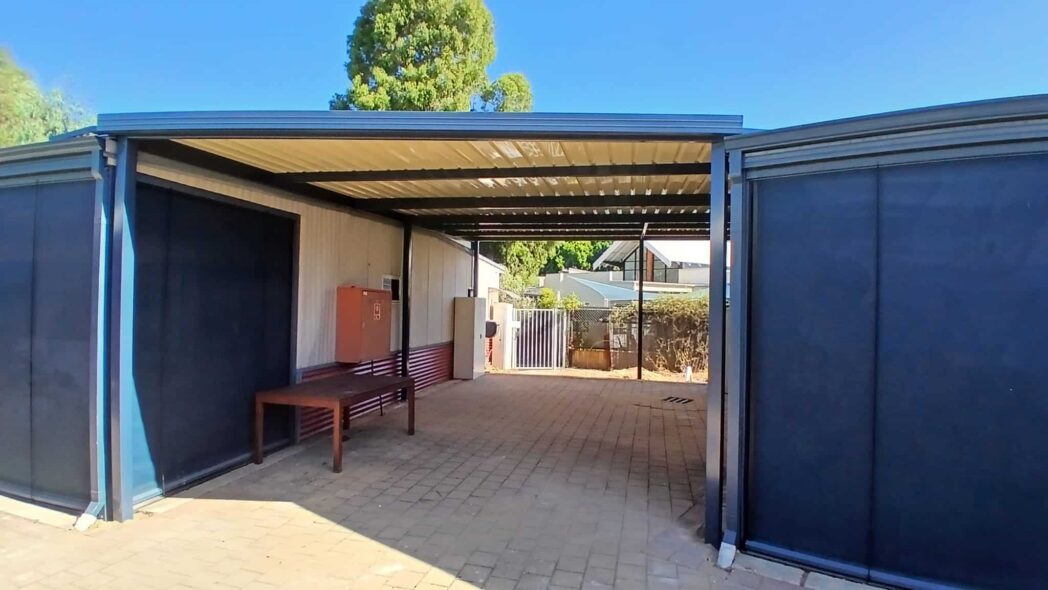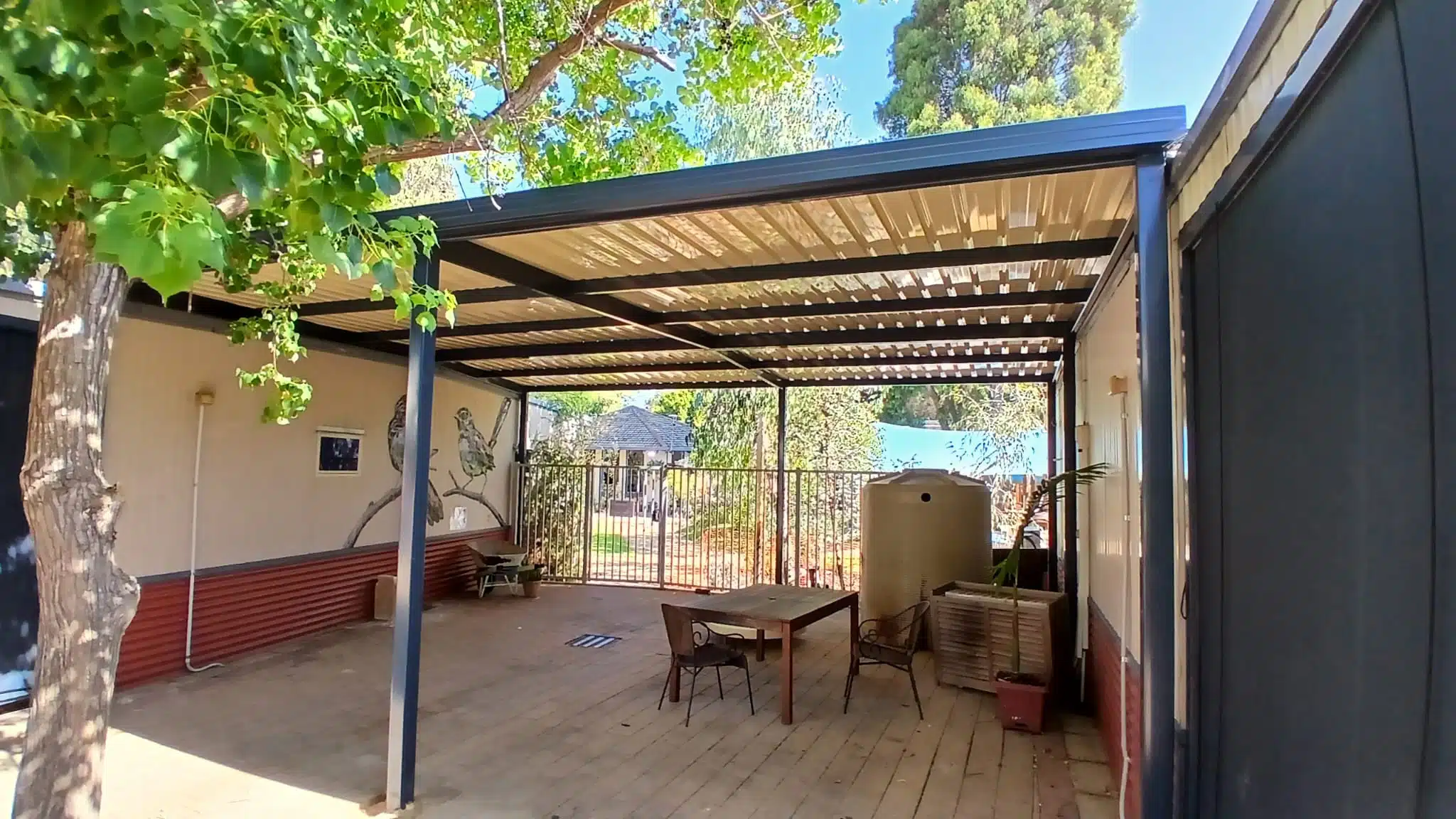
When planning an outdoor living space in Australia, many homeowners ask:
“What is a covered patio roof called?”
The answer isn’t as simple as one name. In fact, covered patio roofs go by many names, depending on the design, materials, structure, and functionality. Understanding the various types of covered patio roofs will help you choose the perfect structure for your lifestyle, climate, and budget.
In this article, we explore the most common names and styles of covered patio roofs, their key features, and how they’re used across Australian homes.
A covered patio roof is a structure that provides overhead protection for your patio or outdoor entertaining area. It shields against:
Rain
Harsh sun
Debris and falling leaves
Wind (when combined with screens or walls)
Covered patio roofs create comfortable, year-round outdoor spaces that enhance your backyard and add value to your home.
Here are the most widely used terms:
A pergola is one of the most popular and versatile patio roof options. It traditionally features a timber or metal frame with either:
Open rafters (decorative shade)
Louvre roofs, or
Roofing sheets (for full cover)
Pergolas can be freestanding or attached to your home. While pergolas originally referred to open-roof structures, in modern Australia, the term often includes covered variants with Colorbond, polycarbonate, or insulated panels.
This is the most general term used across Australia. A patio roof refers to any type of structure that provides a cover for a paved or decked outdoor area. It may be:
Flat or pitched
Freestanding or attached
Made with metal, timber, or composite materials
“Patio cover” and “patio roofing” are commonly used in the building and renovation industries.
An alfresco area is typically a covered outdoor space that is integrated into the main roofline of the home—especially in new builds. It may be tiled or paved, with a roof that matches the home’s architecture.
This is not a separate patio structure but an in-built extension. However, many homeowners extend their alfresco areas using insulated patio roofs or pergolas.
A verandah is a roofed platform along the outside of a house, typically wrapping around one or more sides. In Australia, it’s a traditional design, especially in Queenslanders and country homes.
Verandahs often form part of a covered patio area and may include railings or posts.
A gazebo is a freestanding, covered structure that is often octagonal or round. While more decorative than functional, it can serve as a patio roof for garden dining or lounging.
Gazebos usually feature timber frames and can be roofed with tiles, thatch, or steel.

Understanding the structural design of patio roofs helps narrow your choices. Here are some common roof types:
Minimalist look
Easy to install and cost-effective
Works well with SolarSpan or Cooldek insulated panels
Flat patio roofs are ideal for modern homes and suit backyards with height restrictions.
Also called a monopitch roof
Features a single slope
Provides good water runoff and modern aesthetics
A skillion patio roof can attach to the house or stand alone, often using Colorbond roofing for durability.
A classic pitched roof with a central ridge
Creates an airy, open feeling beneath
Great for ventilation and visual impact
Gable roofs are ideal for outdoor entertainment areas and can be matched with your home’s existing roofline.
Features four sloped sides, converging at a peak
Highly durable and wind-resistant
Elegant and often used in large patios or high-end homes
More complex to construct but offers a polished, architectural finish.
A modern design with an arched or wave-like profile
Provides strong visual appeal and good drainage
Made with polycarbonate or steel sheeting
Perfect for contemporary homes or those wanting a softer design aesthetic.
Let’s look at materials commonly used for roofing Australian patios:
Most popular option
Available in many colours and profiles
Long-lasting, low-maintenance, and fire-resistant
Used in flat, gable, and skillion roofs. Often paired with steel frames for maximum durability.
Brands like SolarSpan and Cooldek
Combine roofing, insulation, and ceiling finish in one product
Keeps the patio cool in summer and reduces noise
Slightly more expensive but ideal for year-round comfort.
Clear or tinted options
Let light through while blocking UV
Budget-friendly and great for plants
Best for patios where natural light is important, like garden courtyards or green spaces.
Used mainly for frames, rafters, and decorative elements
Creates a warm, classic or rustic aesthetic
Requires ongoing maintenance in the Aussie climate
Often used in combination with steel or polycarbonate roofing for balance.
Whether you’re renovating or starting from scratch, here’s how to personalise your patio roofing to suit your lifestyle:
Add ceiling fans or lighting for evening use
Incorporate downpipes and gutters for drainage
Include skylights or open panels for natural light
Use insulated panels if you plan to use the patio year-round
Add screens or blinds for wind and sun protection
It depends on your:
Budget
Climate
House style
Intended use (dining, entertaining, lounging, etc.)
Go for flat or skillion roofs using Colorbond or polycarbonate panels.
Choose insulated roof panels like SolarSpan with a gable design for ventilation.
Consider a curved or gable design with matching colours and clean lines to suit modern or heritage homes.
So, what is a covered patio roof called?
It could be a pergola, patio roof, alfresco cover, verandah, or something else entirely depending on the style and structure. The key is to choose a design that balances cost, comfort, and character.
At Patio Factory, we specialise in custom-designed patio roofs using quality materials like Colorbond steel and insulated roofing. Whether you’re after a budget-friendly flat roof or a luxurious gable design, we’ll help you build a covered patio you’ll love.
Need help choosing the right patio roof?
Contact the Patio Factory team today for a free design consultation and quote.
Check out out social Media

